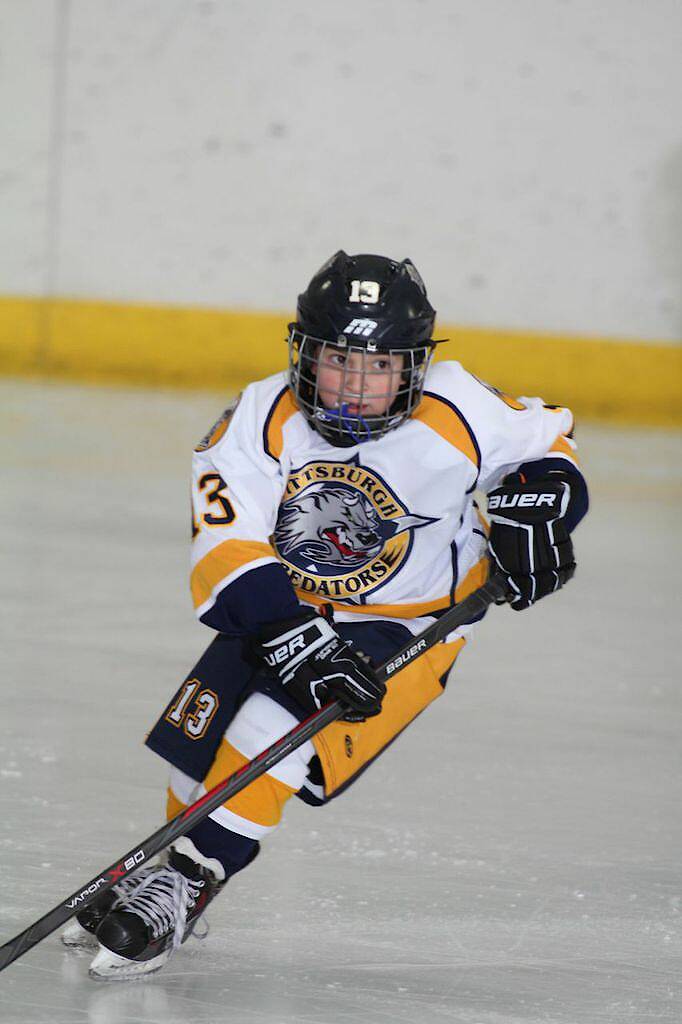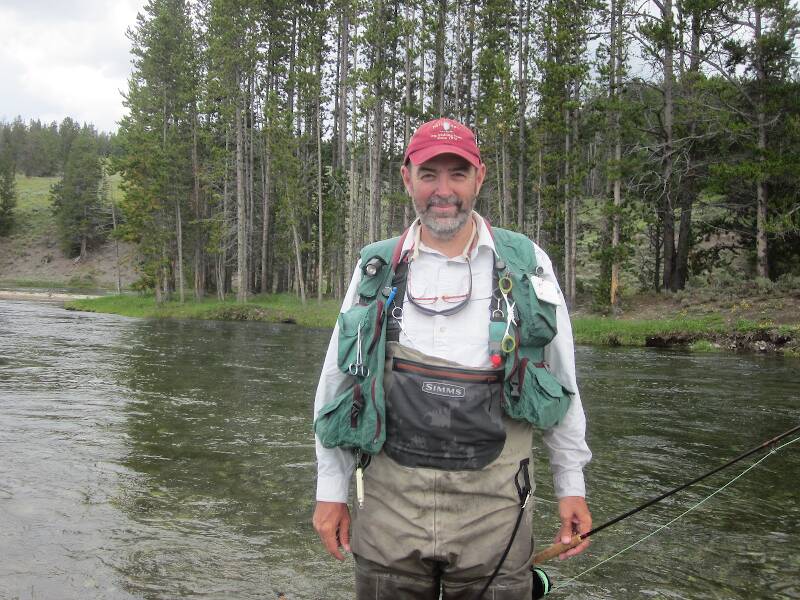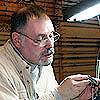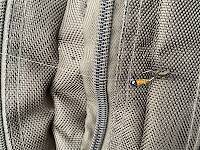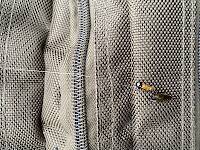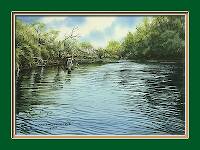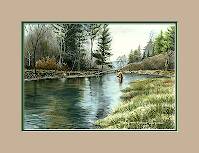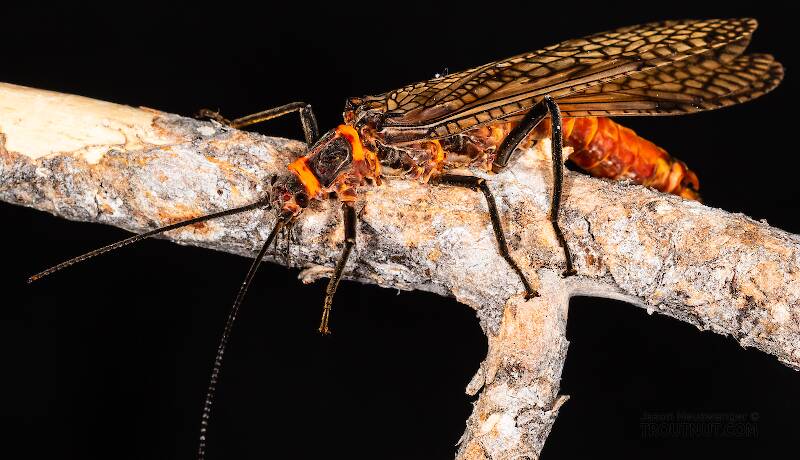
Salmonflies
Pteronarcys californica
The giant Salmonflies of the Western mountains are legendary for their proclivity to elicit consistent dry-fly action and ferocious strikes.
Featured on the forum
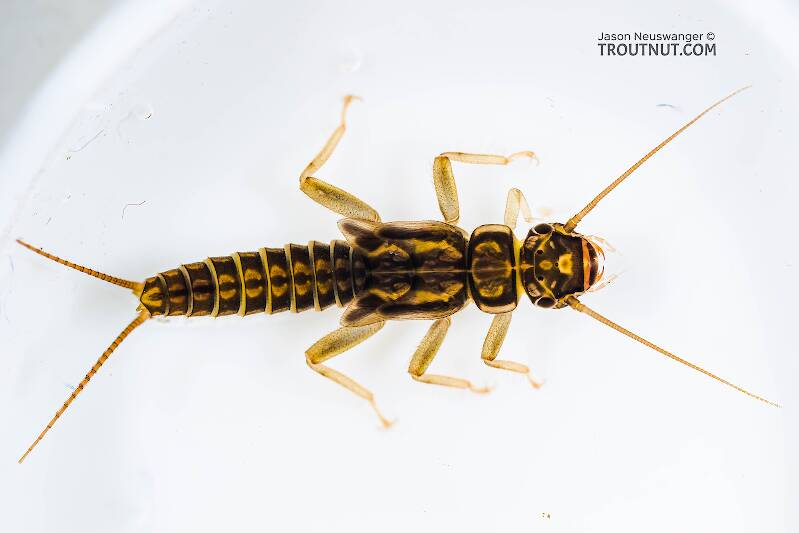

Troutnut is a project started in 2003 by salmonid ecologist Jason "Troutnut" Neuswanger to help anglers and
fly tyers unabashedly embrace the entomological side of the sport. Learn more about Troutnut or
support the project for an enhanced experience here.
Gutcutter on Oct 25, 2010October 25th, 2010, 3:25 am EDT
shawn mentioned
"And as far as water goes, Mark obviously approaches the subject with a little more intimate knowledge of the substance than your average person does. He sees it through a fisherman's eyes. The stream in that last painting is unbelievable. I'd love to see it in person."
i noticed the stream, too. but i was looking for rising fish in that beautiful pool. and then i noticed the open loop of a wet fly fisherman.
certainly, mark paints from experience.
"And as far as water goes, Mark obviously approaches the subject with a little more intimate knowledge of the substance than your average person does. He sees it through a fisherman's eyes. The stream in that last painting is unbelievable. I'd love to see it in person."
i noticed the stream, too. but i was looking for rising fish in that beautiful pool. and then i noticed the open loop of a wet fly fisherman.
certainly, mark paints from experience.
All men who fish may in turn be divided into two parts: those who fish for trout and those who don't. Trout fishermen are a race apart: they are a dedicated crew- indolent, improvident, and quietly mad.
-Robert Traver, Trout Madness
-Robert Traver, Trout Madness
Oldredbarn on Oct 25, 2010October 25th, 2010, 4:25 am EDT
but i was looking for rising fish in that beautiful pool
Tony,
It's funny you mentioned this...I wonder how many of us watch for rises everytime we are near any water...I watch for them in movies on the TV when ever there is a nice stream in the background. Other folks are watching the movie, I'm watching for a rise.
Some old westerns were filmed in some nice looking locations...Nice looking water in the background.
Spence
"Even when my best efforts fail it's a satisfying challenge, and that, after all, is the essence of fly fishing." -Chauncy Lively
"Envy not the man who lives beside the river, but the man the river flows through." Joseph T Heywood
"Envy not the man who lives beside the river, but the man the river flows through." Joseph T Heywood
Shawnny3 on Oct 26, 2010October 26th, 2010, 2:21 pm EDT
This will probably not be the last time I regret having posted that rant about what flytying is to me. I would delete it, but it is what it is - a rant that reflects what I was thinking at the time and is open to the criticism of others. I hope it dies a quiet death as that thread gets buried beneath many others, but that might be too much to hope for, what with Louis prowling around. Someday I'll post some fly I tied with foam, plastic, rubber and glow-bug yarn, and Louis will be there to bump my rant back into the limelight. On second thought maybe I should delete it.
I agree with you, Mark, that great art comes from a synergy between our artistic and analytical bents. I would contend that the ideal is when the distinction between the two blurs and they happen simultaneously in our thinking. Many people, as you observe, do in fact get so tied to the "real world" that they forget how to be imaginative and creative. I see that happening to myself in some ways even as other aspects of my thinking improve. For example, I used to be able to fake all sorts of accents, but when I try to do that now I'm embarrassingly bad at it - nothing worse than a bad impression. Too many years of neglecting the skill, I guess.
I find that the opposite problem afflicts too many artists, though - they use their right brain to the exclusion of reason, and their art as a result is sloppy and without clear vision and context. Perhaps this is a reflection of anything-goes post-modern thinking and our general aversion to judging any expression as objectively good or bad. But I see a lot of what I would just call bad art, and I think much of it comes from artists having their heads in the clouds instead of their feet on the ground.
Arnold Schonberg wrote a lot of dissonant atonal music at a time when composers were really questioning what constituted music and pushing its limits. His work was about as modern and cutting-edge as it got, yet he wrote within traditional frameworks. When asked why he didn't go as far as others in deconstructing the overall musical structure, his response was simple: Without a context, music would devolve into chaos and cease to be music - how do you compose on a foundation of nothing? This has always struck me as sound reasoning.
Perhaps in art there is no right or wrong. An artist can't truly be an artist while playing by all the critics' rules. Perhaps the lines we draw and choices we make, then, are largely for ourselves. But drawing them is important, I think, in giving us a framework for our creativity. I have no doubt my opinions about flytying will change, but I won't apologize for having them. Whether others agree with them or not, they guide me.
-Shawn
I agree with you, Mark, that great art comes from a synergy between our artistic and analytical bents. I would contend that the ideal is when the distinction between the two blurs and they happen simultaneously in our thinking. Many people, as you observe, do in fact get so tied to the "real world" that they forget how to be imaginative and creative. I see that happening to myself in some ways even as other aspects of my thinking improve. For example, I used to be able to fake all sorts of accents, but when I try to do that now I'm embarrassingly bad at it - nothing worse than a bad impression. Too many years of neglecting the skill, I guess.
I find that the opposite problem afflicts too many artists, though - they use their right brain to the exclusion of reason, and their art as a result is sloppy and without clear vision and context. Perhaps this is a reflection of anything-goes post-modern thinking and our general aversion to judging any expression as objectively good or bad. But I see a lot of what I would just call bad art, and I think much of it comes from artists having their heads in the clouds instead of their feet on the ground.
Arnold Schonberg wrote a lot of dissonant atonal music at a time when composers were really questioning what constituted music and pushing its limits. His work was about as modern and cutting-edge as it got, yet he wrote within traditional frameworks. When asked why he didn't go as far as others in deconstructing the overall musical structure, his response was simple: Without a context, music would devolve into chaos and cease to be music - how do you compose on a foundation of nothing? This has always struck me as sound reasoning.
Perhaps in art there is no right or wrong. An artist can't truly be an artist while playing by all the critics' rules. Perhaps the lines we draw and choices we make, then, are largely for ourselves. But drawing them is important, I think, in giving us a framework for our creativity. I have no doubt my opinions about flytying will change, but I won't apologize for having them. Whether others agree with them or not, they guide me.
-Shawn
Jewelry-Quality Artistic Salmon Flies, by Shawn Davis
www.davisflydesigns.com
www.davisflydesigns.com
Softhackle on Oct 26, 2010October 26th, 2010, 3:20 pm EDT
Shawn,
No criticism was intended. We all work our own way. I agree, you must have a basic understanding of the principals and elements of any art BEFORE you can break the rules, so to speak.
An American artist I truly admire for his ability to heighten our sensitivity was Andrew Wyeth. To me he was a master craftsman who had an incredibly great sense of composition. I remember hearing a very funny story about a time when he was out on a beach doing a painting of a lighthouse. Two women came upon him and looked at the painting. It seems Wyeth had composed the painting oddly and actually cut off the top of the lighthouse in the painting. For some reason, this is what he wanted to do. Well, one of the ladies remarked to the other in a whisper, " Andrew Wyeth wouldn't paint it that way!"
Another great man I admire was a professor I met at Syracuse U. His Name was Dr. Larry Bakke. I got to know him pretty well taking a number of classes from him. We'd often walk from class to class together and talk. One thing I learned from him was that ART is a language, and generally, people do not understand it because they don't know the vocabulary.
Mark
No criticism was intended. We all work our own way. I agree, you must have a basic understanding of the principals and elements of any art BEFORE you can break the rules, so to speak.
An American artist I truly admire for his ability to heighten our sensitivity was Andrew Wyeth. To me he was a master craftsman who had an incredibly great sense of composition. I remember hearing a very funny story about a time when he was out on a beach doing a painting of a lighthouse. Two women came upon him and looked at the painting. It seems Wyeth had composed the painting oddly and actually cut off the top of the lighthouse in the painting. For some reason, this is what he wanted to do. Well, one of the ladies remarked to the other in a whisper, " Andrew Wyeth wouldn't paint it that way!"
Another great man I admire was a professor I met at Syracuse U. His Name was Dr. Larry Bakke. I got to know him pretty well taking a number of classes from him. We'd often walk from class to class together and talk. One thing I learned from him was that ART is a language, and generally, people do not understand it because they don't know the vocabulary.
Mark
"I have the highest respect for the skilled wet-fly fisherman, as he has mastered an art of very great difficulty." Edward R. Hewitt
Flymphs, Soft-hackles and Spiders: http://www.troutnut.com/libstudio/FS&S/index.html
Flymphs, Soft-hackles and Spiders: http://www.troutnut.com/libstudio/FS&S/index.html
Shawnny3 on Oct 27, 2010October 27th, 2010, 5:11 am EDT
Certainly no offense was taken, Mark, and criticism is welcome. I am continually challenging my own preconceptions, and learn a lot from both my own criticisms and those of others.
Interesting you advise knowing the rules before breaking them - I almost wrote that exact statement in my last post. Great writers, for example, will at times break established rules of composition, but they usually do so only rarely and with a purpose, and could certainly write within the rules if they were required to. I think E.B. White speaks well on this topic in the section he added to Strunk's original book on composition (the modern form of which is now known as The Elements of Style, one of my absolute favorite books). It's good stuff that has much broader application than just to writing. Of all the books I've read, it has had perhaps the most influence on my approach to flytying.
-Shawn
Interesting you advise knowing the rules before breaking them - I almost wrote that exact statement in my last post. Great writers, for example, will at times break established rules of composition, but they usually do so only rarely and with a purpose, and could certainly write within the rules if they were required to. I think E.B. White speaks well on this topic in the section he added to Strunk's original book on composition (the modern form of which is now known as The Elements of Style, one of my absolute favorite books). It's good stuff that has much broader application than just to writing. Of all the books I've read, it has had perhaps the most influence on my approach to flytying.
-Shawn
Jewelry-Quality Artistic Salmon Flies, by Shawn Davis
www.davisflydesigns.com
www.davisflydesigns.com
Softhackle on Oct 27, 2010October 27th, 2010, 5:26 am EDT
Sounds interesting. I'll see if I can locate a copy.
Mark
Mark
"I have the highest respect for the skilled wet-fly fisherman, as he has mastered an art of very great difficulty." Edward R. Hewitt
Flymphs, Soft-hackles and Spiders: http://www.troutnut.com/libstudio/FS&S/index.html
Flymphs, Soft-hackles and Spiders: http://www.troutnut.com/libstudio/FS&S/index.html
Shawnny3 on Oct 28, 2010October 28th, 2010, 6:59 am EDT
I think you'd find it worth the few dollars it costs, Mark.
I actually went back (as I often do) and re-read part of it over the past few days. If you get a copy, you may notice that my rant in that other thread is in egregious violation of White's 17th "Reminder" in his section on style. I knew there was a reason I wanted to delete it.
-Shawn
I actually went back (as I often do) and re-read part of it over the past few days. If you get a copy, you may notice that my rant in that other thread is in egregious violation of White's 17th "Reminder" in his section on style. I knew there was a reason I wanted to delete it.
-Shawn
Jewelry-Quality Artistic Salmon Flies, by Shawn Davis
www.davisflydesigns.com
www.davisflydesigns.com
Softhackle on Oct 28, 2010October 28th, 2010, 8:25 am EDT
As a matter of documentation, Gutcutter is now the proud owner of "Rainbow In Hiding". I arrived for him today! I trust it was in good condition? If not, let me know. I hope it meets your expectations.
Mark
Mark
"I have the highest respect for the skilled wet-fly fisherman, as he has mastered an art of very great difficulty." Edward R. Hewitt
Flymphs, Soft-hackles and Spiders: http://www.troutnut.com/libstudio/FS&S/index.html
Flymphs, Soft-hackles and Spiders: http://www.troutnut.com/libstudio/FS&S/index.html
Gutcutter on Oct 28, 2010October 28th, 2010, 3:15 pm EDT
Mark
It is even more impressive in-person than on the forum.
I am not disappointed.
It will be framed this coming week and proudly placed on a wall in my fly tying room.
I will need to make some space for it and already have a good idea where it will go.
Thanks for letting me purchase it. Maybe some more prints in the future???
Tony
It is even more impressive in-person than on the forum.
I am not disappointed.
It will be framed this coming week and proudly placed on a wall in my fly tying room.
I will need to make some space for it and already have a good idea where it will go.
Thanks for letting me purchase it. Maybe some more prints in the future???
Tony
All men who fish may in turn be divided into two parts: those who fish for trout and those who don't. Trout fishermen are a race apart: they are a dedicated crew- indolent, improvident, and quietly mad.
-Robert Traver, Trout Madness
-Robert Traver, Trout Madness
Quick Reply
Related Discussions
Topic
Replies
Last Reply


